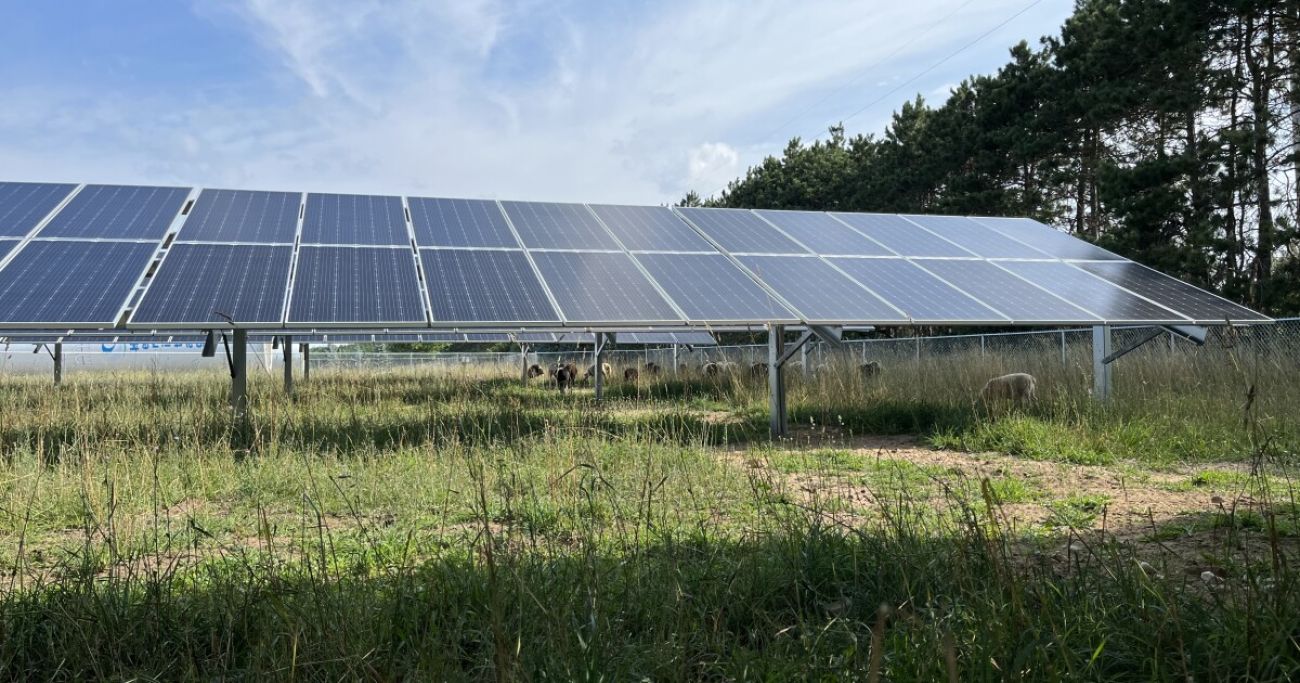Amid repeal push, Michigan seeks input on solar, wind siting law

• The Michigan Public Service Commission is gathering public input on how to implement a new law that gives it final say in approving large renewable energy projects
• The Michigan Townships Association and other groups have concerns about what local participation in renewable energy siting will look like
• A group called Citizens for Local Choice is gathering signatures in an effort to repeal the law
The Michigan Public Service Commission is gathering public input on a controversial new law, Public Act 233, which gives it final authority in approving large renewable energy projects.
“We want to make sure that we're doing it in an open and transparent way, that we're relying on the expertise of local governments, of planners and others, and really providing opportunities for the public to input into the process and share their views,” said commission Chair Dan Scripps.
Last fall, Michigan lawmakers narrowly passed a set of climate bills that accelerate the state’s transition to clean and renewable energy.
Earlier this month the commission laid out its plans to implement that legislation, including larger energy waste reduction goals and requiring utilities to generate at least 50% of their energy from renewable sources by 2030 and 60% by 2035.
It’s also tackling implementation of the new law giving the state final approval of large renewable projects. That includes solar arrays with a capacity of at least 50 megawatts, wind facilities with a capacity of at least 100 megawatts and energy storage facilities of at least 50 megawatts.
The state's process
The commission will consider several factors when deciding which projects to approve, Scripps said, like how easily a project can connect to the grid and the availability of land. That could determine where projects are built in places like northern Michigan.
“In reviewing applications, once they ultimately do get filed with the commission, we actually need to consider the impact on prime farmland and on specialty crop land, which is more of a consideration in northwest Michigan, in some ways, with the tart cherry acreage and the like,” he said.
The process has to start at the local level if there is a renewable energy ordinance compatible with the state’s provisions, Scripps said. But developers can apply for siting approval through the public service commission directly in some instances, like if a local government has a moratorium on projects. If it denies a project or doesn’t make a decision within the time set by the legislation, for example, the company can also file an application with the commission.
Still, Scripps said, the law includes ways for local governments to weigh in on that process. It allows governments and neighboring landowners to participate in cases brought before the commission. In those cases the developer has to pay up to $75,000 to each local government for legal expenses. It also requires developers to pay $2,000 per megawatt to the community in which a project is located.
“I think we're all hopeful that the process at the local level can work,” he said. “But again, for those projects of statewide significance that are important in terms of how we maintain reliability and keep energy affordable, that ultimately there is a state process that would start in November of this year if things get bogged down.”
Uncertainty and opposition
The law is on the books, but there are still a lot of questions, Scripps said, and public input is especially important when it comes to balancing local control of projects with the state's needs for reliable and affordable energy.
Michigan has a long history of local control over land use, and the renewable approval law has been the center of a debate about what the state’s energy transition should look like.
Even as commissioners look for guidance on how the law should be implemented, some people are fighting to do away with it altogether.
The group Citizens for Local Choice has started a petition to repeal it, aiming to collect 550,000 signatures from people across the state to get it on the ballot in November.
Major players like the Michigan Farm Bureau now support it. Earlier this month, the Michigan Townships Association board decided to support the repeal as well.
Judy Allen, the director of government relations for the Michigan Townships Association, said many of the association’s members are not happy with the law, in part because of the time already spent crafting local ordinances around renewable energy projects. And there’s also a lot of confusion surrounding the process.
“If we have an existing ordinance, how does that impact us?” she said, listing some common questions. “If we want to do a compatible renewable energy ordinance, what does that have to contain? If we choose not to, does that mean that they automatically apply directly to the state?”
Allen said she’s heard questions in recent meetings she doesn't know how to answer.
“I had to state: ‘We don't know how the commission is going to interpret this,’” she recalled.
Allen told people about the virtual workgroups, which she hopes result in more clarity.
“Even if it's guidance and best practices from the commission’s standpoint, that will give local units of government, whether it's a city, township, village or county, a better understanding of what will occur,” she said.
Putting all of the state’s new climate laws in place is going to take a lot of effort and money. Michigan expects to spend $7 million getting the climate legislation off the ground.
The renewable siting law is set to go into effect in November.
The engagement sessions will take place in March.
Michigan Environment Watch
Michigan Environment Watch examines how public policy, industry, and other factors interact with the state’s trove of natural resources.
- See full coverage
- Subscribe
- Share tips and questions with Bridge environment reporter Kelly House
Michigan Environment Watch is made possible by generous financial support from:
Our generous Environment Watch underwriters encourage Bridge Michigan readers to also support civic journalism by becoming Bridge members. Please consider joining today.
See what new members are saying about why they donated to Bridge Michigan:
- “In order for this information to be accurate and unbiased it must be underwritten by its readers, not by special interests.” - Larry S.
- “Not many other media sources report on the topics Bridge does.” - Susan B.
- “Your journalism is outstanding and rare these days.” - Mark S.
If you want to ensure the future of nonpartisan, nonprofit Michigan journalism, please become a member today. You, too, will be asked why you donated and maybe we'll feature your quote next time!






